Review: Nutcracker and the Four Realms
Over Christmas, by mischance, I happened to watch Disney’s NUTCRACKER AND THE FOUR REALMS a visually splendid but thematically atrocious movie, with a plot by turns senseless, pointless, dull, predictable, puerile and mildly insulting; which seems to be the hallmark of modern Disney.
However, the film serves as a perfect example of how to ruin a story via political correctification.
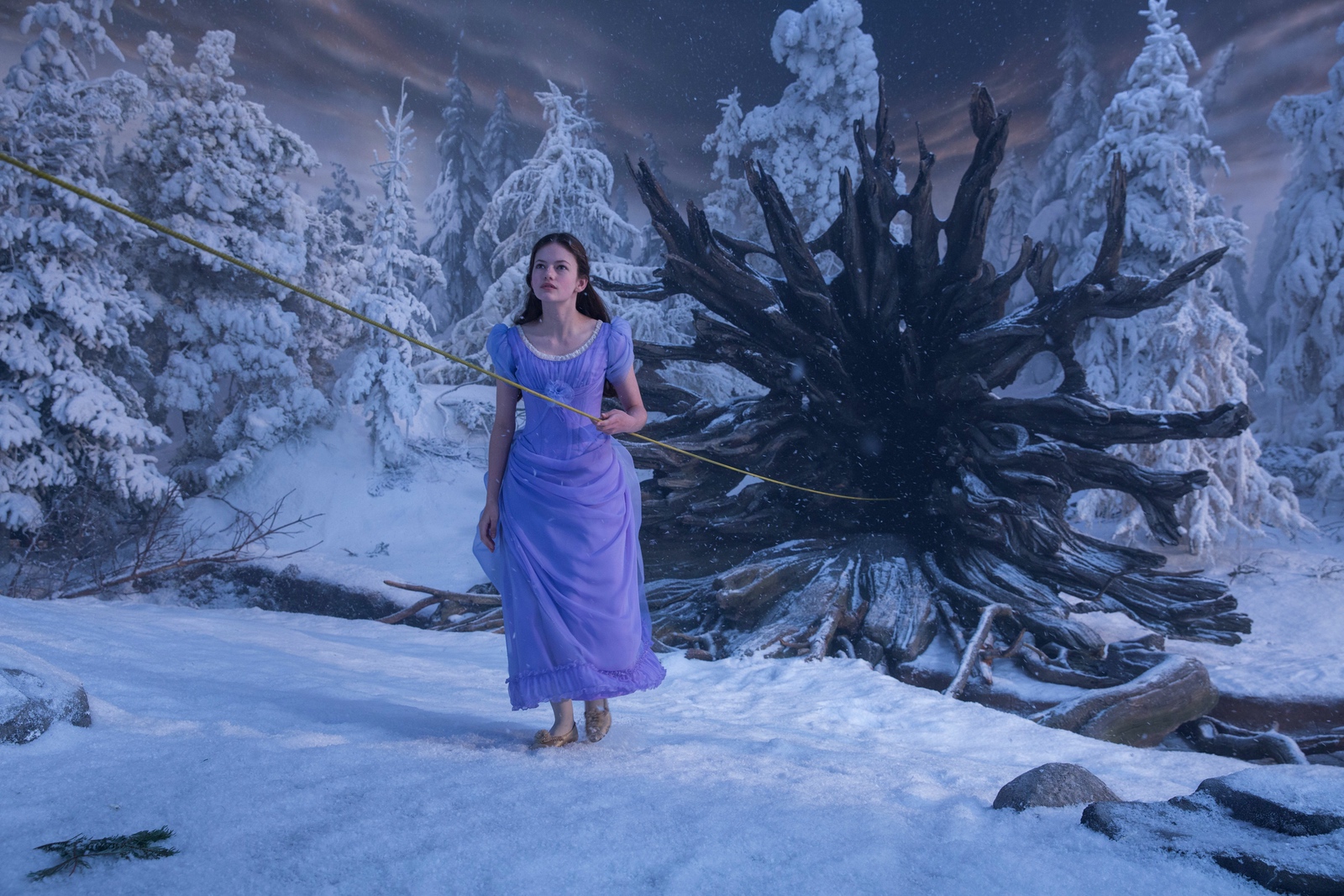
This column is not a so much a film review as much as a treatise on how to ruin a story. Spoilers abound, but this is the type of movie that was spoiled before release, in the sense of being rotten, so read on.
This film may not contain an example of every error into which “Wokeness” might lure a sleepwalker lobotomized by political correctness, but it contains the most frequent and atrocious. And it will serve as a perfect example to see why the spirit of “Wokeness” drives away the spirit of the Arts. The Imp of Woke and Muse of story telling cannot tolerate each other.
To be sure, I did not expect any adaptation of Nutcracker to have a two-fisted action tale, full of thrills and chills and sudden plot-twists. There is only so much one can do with this ballet.
In the original ballet, the Nutcracker fights the Rat King first half of the first act, dies, and is reborn as a handsome prince, all in the first act; and this is followed by one dance after another from various foreign lands or fairy courts representing the various Christmas treats: chocolate from Spain, coffee from Arabia, tea from China, candy canes from Russia, ginger bread matrons and sugar plum fairies.
Nonetheless, any writer of ordinary skill could work out some sort of fairytale plot with this material, or return to the original short story by Alexander Dumas or E.T.A. Hoffmann on which the ballet is based.
In that tale, a girl’s love breaks a spell on an ugly nutcracker wounded in her defense, restoring him to a handsome prince, whereupon the two are wed, and rule toyland happily forever after. Moral of the story: true love sees inward worth.
However, Political Correctness imposes self-censorship protocols on the ideology-controlled brain stricter than those which Stalin imposed on the state-controlled press. Political Correctness necessarily drains away drama and audience appeal, unlike Stalinism, within whose strait jacket retains leeway enough to allow for a serviceable story. More on this below.
Fairness requires those things done well be saluted: the actress Mackenzie Foy was charming to look at and carried herself well, despite the lines she was given to say. Morgan Freedman is simply an excellent actor, despite being deliberately miscast here as Drosselmeyer, the toymaker wizard, being the only Negro Prussian of the Eighteenth Century.
All the art direction and special effects are either nicely done, or expertly done, and the particular scene where Clara, played by Foy, follows a thread through a strangely changing hallway and into fairyland touches a sublime note. Had the rest of the film captured, or at least not betrayed, the magic inherent in that one scene, this would not be a negative review.
The plot here is that Clara and her father quarrel, as both are selfish and petty. The mother is dead, but has left a gift in her last will her to Clara, an egg-shaped puzzle box, along with a note saying “Everything you need is inside” — but the box is locked.
Clara, as it turns out, like her mother before her, is a magical toymaker as skilled or moreso than Drosselmeyer, despite having no training in these arts. The puzzle box lacks a key: to find the key, Clara must travel to fairytale toyland, here called the Four Realms, where the toys her mother made sprang to life and made her queen. Upon arriving, the key is stolen by a mouse, and hijinks ensue.
The nutcracker, strangely, does not appear in this film. In his stead is a rather effete black man dressed as a cavalry Hussar who is the guard at a toll bridge. Discovering Clara’s identity, he swears fealty to her, an act to which she is rightfully indifferent; and thereafter follows her around, accomplishing not much of anything, and doing not much of anything.
It was not until looking up the IMDB information concerning this film for this review, that I saw this tollhouse guard was listed as the Nutcracker.
There was nothing inside the film itself to indicate that is the character’s role. There is no romance between the two; he saves her from no rat king; he is not wounded nor bandaged by her; nor does she dote on him nor break any spell on him to restore him to his handsome true form.
Indeed, the character was so soft-eyed and soft-voiced that I supposed a romance with any person of the female persuasion was meant to be out of the question. If this actor is a heterosexual male, he earns my compliments on his acting skill, for his on-screen persona is not.
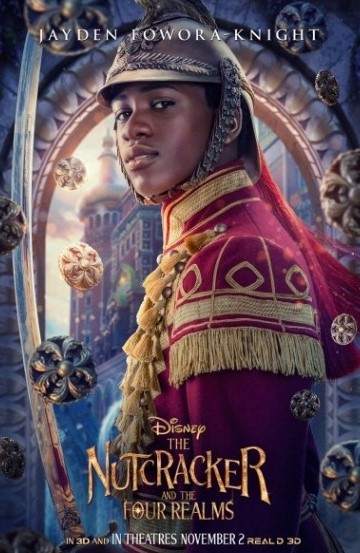
I cannot think of any parallel example of a character having so little in common with the source material. One would need to be a forensic detective able to reconstruct crime scenes from microscopic evidence to detect that this bland tollhouse Hussar was meant to be the Nutcracker. I suppose there is a clue in the fact that Drosselmeyer as well as he were race-swapped: in the original, he was Drosselmeyer’s nephew.
In any case, Clara soon encounters four more characters, two women and two soft-eyed soft-voiced persons most likely biologically male, the kings and queens of the four realms of toyland. The gingerbread queen is said to be a traitor, but, in the stupidest plot twist imaginable, the sugar plum fairy is the traitor.
It seems the toys in toyland resent Clara’s mother for dying, or not loving them sufficiently, or something, which is a clever parallel to Clara’s own resentment against her father, and just as shallow.
The magic key falls into the clutches of the Evil Sugar Plum Fairy, who creates an army of tin toy soldiers.
These are hollow, and even the diminutive albeit buxom figure of Miss Foy, teen actress, five foot three, weighing in at one hundred and three pounds, can knock one over with a dainty kick, and so they are no threat at all.
Clara opens the puzzle box egg, and inside is nothing but a mirror. Moral of the story: You are everything you need. Take pride in yourself for being so wonderfully you! Copernicus called, and admitted he was wrong, the whole world does actually revolve around you.
After some more rigmarole, Evil Sugar Plum Fairy dies the death, peace and order is restored in toyland, and Clara, back in earth, dances with her father. The End.
I cannot convey with what wincing distaste, even hate, crawls across my aching finger-nerves to type the words “Evil Sugar Plum Fairy” or how it scalds my parched eyes to read them.
Like making Santa Claus into an ax-murderer, it is stupid, but also leaves a stain of moral nastiness on the heart. Who would make so harmless and charming a character as the Sugar Plum Fairy from Nutcracker into a villainess?
The answer we know: the woke. The politically correct.
Can she be a real villainess? Will she form a real threat, either really to tempt or really to threaten, our heroine? No, of course not. That would risk introducing an element of drama into the tale. Everything which could have been done to drain all drama and interest and humanity from this film was done.
There is no love story, no marriage, no handsome prince, in this version of the Nutcracker, nor, except in the technical sense, is there any Nutcracker. So there is no protagonist.
There are no male characters at all who display masculine characteristics. Instead there is an ineffectual father who exercises no authority over a wayward girl, an old wizard, a young brother, and various feminine toy-men, and one mouse. There is, in other words, no male lead in any leadership role, or any non-pathetic role, none who who would dare raise his eyes to the heroine with “the male gaze” and look upon her as attractive. To be attractive, in postmodern thought, is to be demeaned.
There is no Rat King, no desperate fight between rats and toys, no one is wounded and needs to be nursed back to health by a girl’s love. There is no antagonist.
No one needs a girl’s love, neither toy nor prince, boy or man. Love is not in this story. This is not a story for girls.
But neither is present here what would normally appear in a tale of four kingdoms involved in intrigue, war, rebellion, lost heirs and so on, which is the sense of camaraderie, team-spirit, self-sacrifice, heroism, as is so clearly on display in a film like ROBIN HOOD starring Errol Flynn, THE CRIMSON PIRATE starring Burt Lancaster, or even THE COURT JESTER starring Danny Kaye. This is not a story for boys.
There is nothing in particular for Clara to do. The McGuffin of the egg-shaped puzzle box contains, as it turns out, nothing but a looking glass, apparently meant to urge the girl to greater self-centeredness than she hitherto displays.
However, since she displayed not even an iota of self-doubt or lack of self-confidence heretofore, this motherly advice from beyond the grave had no meaning.
It is a follow-through with no set-up. There is not even the slightest hint of some task her self doubt prevented her from doing, which, once heartened by the pep talk of “Believe In Yourself!” she could do.
Contrast it with some story that does it well — I can bring to mind the anime MAGIC USER’S CLUB, where the adorable but ditzy main character Sae cannot concentrate nor cast spells due to self-doubt, and this is a constant theme, central to her character. When, out of selfless love for her fallen comrades, sheer desperation makes her forget herself, and forget to worry, she is able to unleash her inner magic to great effect, and end the menace. That story is actually about a girl suffering crippling self doubt who overcomes this. This story is about a nonchalant girl with no particular goals and nothing at stake.
To be fair, there is a scene where Clara must sneak into her own captured castle to recover the magic key from its location plugged into an automated tin-soldier making machine, in order to prevent the creation of a mindless tin-soldier army. But since the threat of the tin soldiers is played for laughs, this scene lacked any point.
The break-in to the fairy castle involves some climbing over slippery ledges and walls, facing dangers any schoolgirl of ordinary health and athletic ability could best.
As mentioned above, the tin soldiers form no threat, and so our heroine needs no soldier of her own, Nutcracker or otherwise, to fend them off. Nonetheless, inexplicably, the tin soldiers manage to capture all the rulers and courtiers of the Four Realms instantly, and take control of toyland immediately, with no one raising any opposition.
The Mouse King who steals the magic key is described in dialog as being a tricky pest, but he does nothing after this initial unmotivated theft to justify this description. He does not, for example, concoct or enact some clever plan to distract guards and free prisoners when the toys are captured by the Evil Sugar Plum Fairy.
He does perform an about-face midway in the film, deciding to aid Clara rather than oppose her, but the motive and meaning of either decision was lost on me, nor did he seem to have any particular part to play nor any particular thing to do.
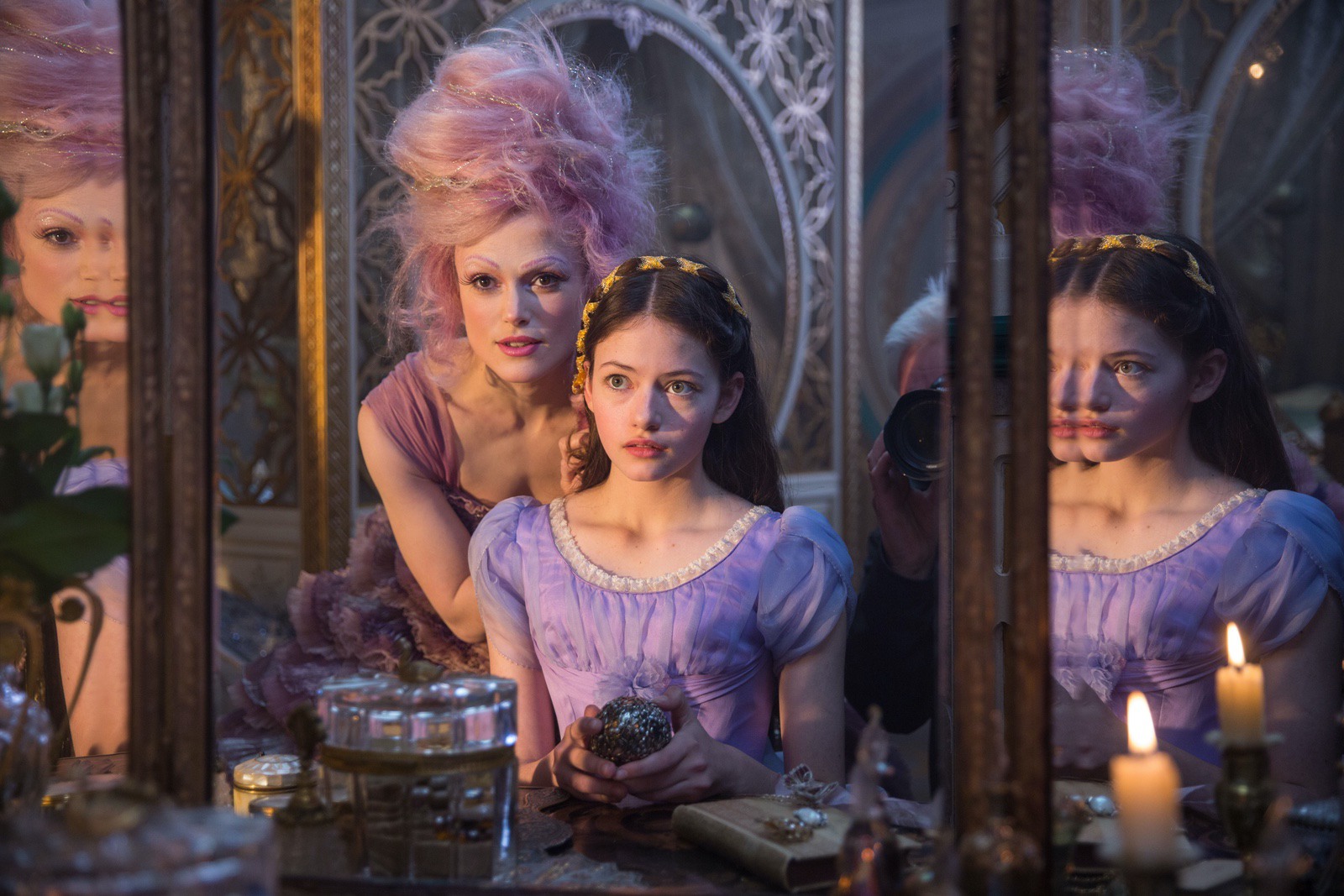
There is no antagonist. The Evil Sugar Plum Fairy, after tricking Clara into inserting the magic key into the tin soldier making machine, announces her desire to rule toyland herself, apparently as a psychological substitute for the lost love of Clara’s mother, the creator and queen of toyland now dead. Which is not a real motivation, come to think of it.
Fairy tale villainesses can have very simple motivations, such as jealousy toward the beauty of Snow White, or malice for not being invited to the christening of Sleeping Beauty, or mere contempt for a stepdaughter in Cinderella, preferring her own children.
But fairy tale villainesses cannot have no motivation, or, more to the point, they cannot have the motivation which the theory of Political Correctness assigns to all wicked ambitions, namely, a psychological desire for social recognition in those starved of the maternal love, not of their mother, but of their government.
Now, in this case, since the government of which the toylanders were deprived was indeed Clara’s dead mother, of whom she was also deprived, and since Clara’s mother failed to give the Sugar Plum Fairy a looking glass and a note telling her she needed nothing other than herself, it is difficult to see why, given the moral compass underpinning this tale, the Sugar Plum Fairy is in the wrong, or what, if anything, she does that is different in motive or mood from anything Clara does.
If anything, since Clara does not want to be queen of Toyland, and Evil Sugar Plum Fairy does, it is not clear why there is any conflict at all.
In addition to having no antagonist nor protagonist, this story has no side characters. There is no one who aids or rescues the heroine, since she needs no help aside from herself for herself.
Since Clara, as a teenaged girl, is as expert a maker of magical toys as Drosselmeyer the wizard, as, indeed, Clara’s mother was before her, Drosselmeyer serves no role here, magical or otherwise, not even the limited role served by the character of the same name in the original ballet, who gives the girl her toy nutcracker, and repairs it after her rambunctious older brother breaks it.
Of course, political correctness also forbids portraying dances, or costumes, or music, from any foreign nations, so we can have a waltz of flowers, but no Chinese nor Arabian dancers. It is either blackface or cultural appropriation or somesuch. One must have no interest in foreign places, cannot hear their music, nor enjoy treats imported therefrom or dishes typical of them. One cannot use any good ideas from abroad. After all, oneself is all that one needs.
So the ballet, which has but the minimal bare bones of a plot, at least has color and spectacle and charm, of which the film has almost none. In the film, there is one dance scene by a famous ballerina.
Also, Clara spends most of the film dressed as a soldier.
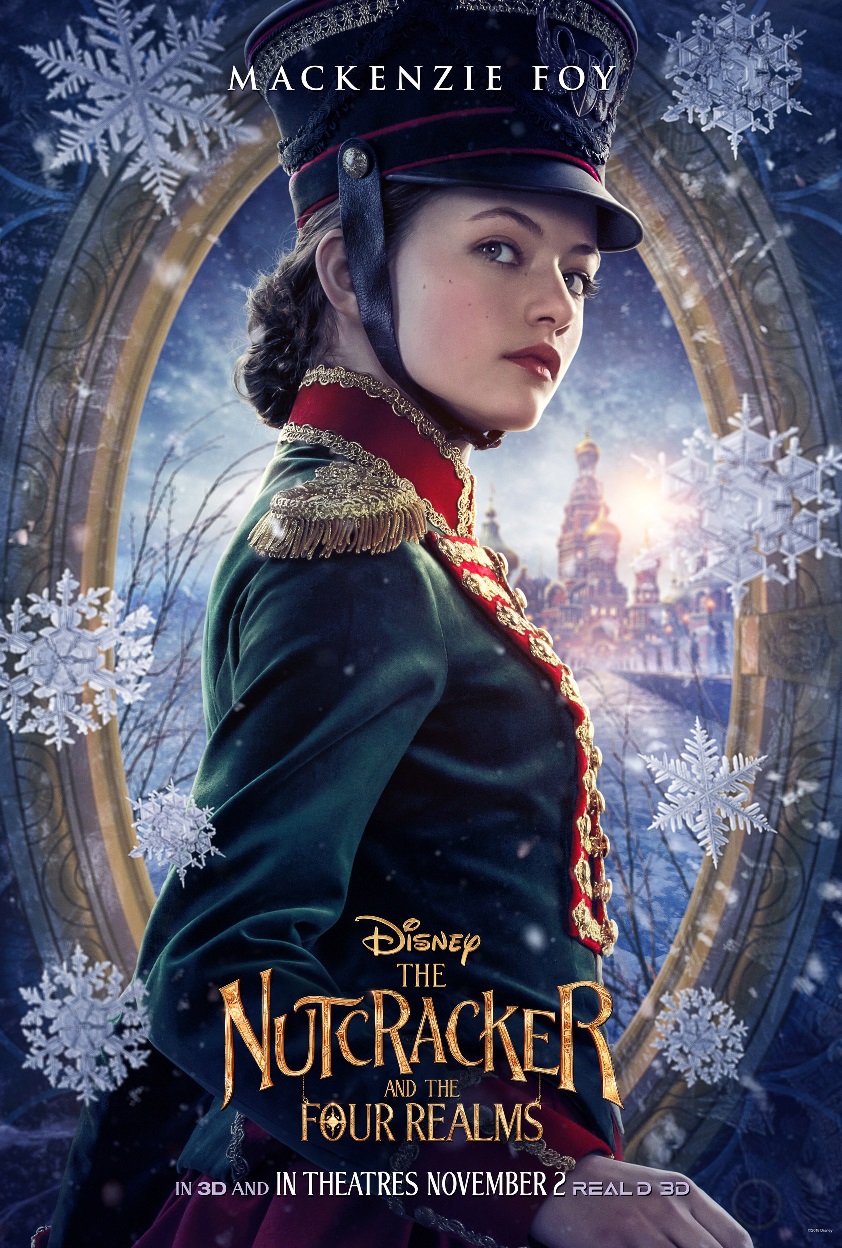
She is cute as a button, no doubt, but let the mental image of soldier boy and soldier girl settle on you mind for a moment, and ask yourself what is missing from it, which is present, for example, in an image of a girl and boy, or of two men-at-arms who are brothers in arms.
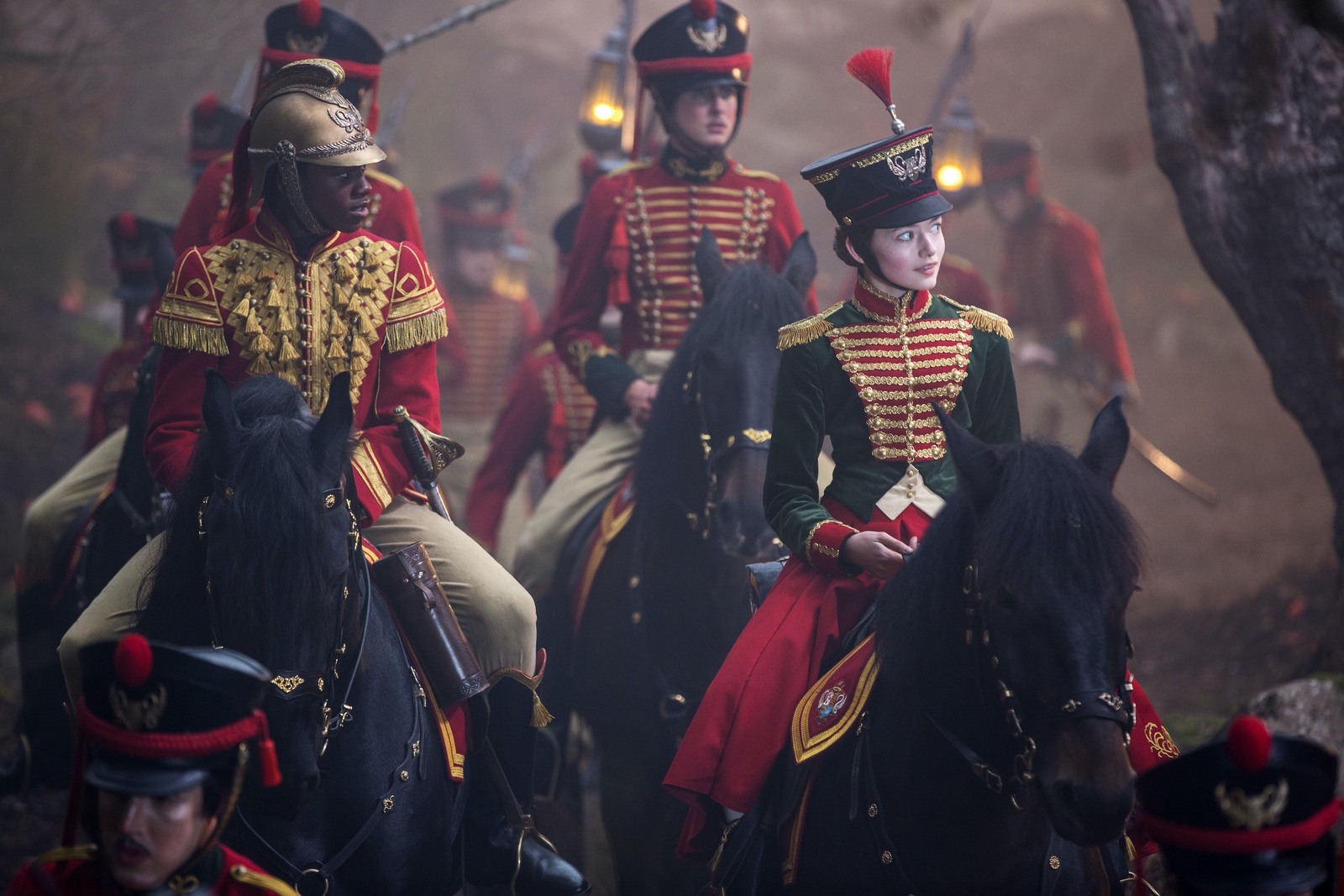
If you can pass the Voight-Kampff Test from BLADE RUNNER, the answer should be clear enough: soldier girl and soldier boy together provokes neither an atmosphere of romantic love, as between girl and boy, nor of brotherly love, as between soldier and soldier serving in a unit.
So there is neither love nor fellowship, nor, as best I could see, any honest family feeling between father and daughter, which apparently was meant to be the central theme of the film. There was no human emotion at all.
If this sounds like a story told by an autistic or emotionally retarded person who lacks all basic human emotions and passions and lacks a basic ability to form human relationships, such as father-daughter or bride-bridegroom, that is because it is.
Political Correctness, at its root, is untruth, and untruth in the emotional realm is emotional retardation.
Political Correctness, as the name suggests, is the pretense that politically convenient untruths be treated as praiseworthy, occupying the moral high ground previously occupied by truth; while truth is treated as blameworthy, being hate speech and thought crime.
Within the strait jacket of Political Correctness, depending on the variation of the disease, some storytelling is possible.
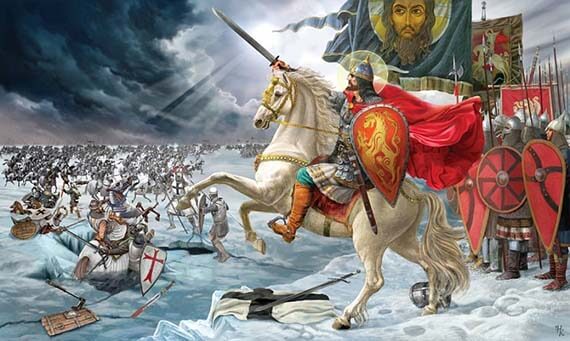
For example, the Stalin era film ALEXANDER NEVSKY passed all Soviet censorship, and is a true work of art as well as being pro-Russian propaganda, because the ideological elements present, asking all men to sacrifice for the greater good, or showing the Teutonic Knights as monsters, are still enough in keeping with normal human emotions (like love of homeland and hatred for Germans) not to ruin the surrounding story, which is a simple tale of war and battle and patriotic sacrifice.
This is because the Stalinist variation of Political Correctness allows for certain human emotions to be portrayed as praiseworthy, including patriotism, romantic love, faith in leaders, self-sacrifice for beloved friends, and so on.
The current variation of the disease does not allow for this degree of latitude: Stalinism abolishes any beneficial relationship between employer and employee by outlawing private property, reducing all men to helotry, abolishing rule of law, but leaving other institutions intact. For example, men and women in Stalin’s Russia still got married and raised families.
On the other hand, Wokeness, which involves both Critical Race Theory and Gender Ideology, abolishes any beneficial relation between the races and sexes.
In Critical Race Theory, the colorblind meritocracy of a classless, raceless society, that is, the equal rule of law, is denounced as a sham, for only racism can cure racism.
In Gender Ideology, love, romance, marriage, and motherhood are denounced as shams. Female inferiority can only cured by becoming male. This can be accomplished by mimicking outward signs, expression, speech patterns and forms of dress, and so on, stereotypical, not of gentlemen, but of vulgar men, including his sexual promiscuity, cusswords, smoking, wearing trousers. Also, much is apparently accomplished by abolishing pronouns. Radical self-mutilation of sexual organs is suggested, as is hormonal self-mutation, but not necessary.
So the institutions of equal rights, rule of law, romance and courtship, marriage and motherhood, are replaced with Pride, the Queen of Sins and the Sin of Satan, which preaches that everything one needs is within the looking glass.
Pride, let it be noted, is less human than even vanity. A vain man may appreciate or even love his audience of flatterers, even if he hisses in jealousy at anyone trying to usurp his spotlight. The proud man does not even care about the spotlight: the opinion of the common ruck means nothing to him.
The central conceit of Pride is that no man is better than you, in any way, at anything. If everything you need is you, then, obviously, you need no one else.
Wokeness, which holds there to be no real distinctions between men, therefore holds that all seen distinctions between men are unjust. This means any difference in skill or ability, talent, interest, or personality trait is a sinister affront. No one can be better nor worse than anyone at anything.
Wokeness holds that random chance should distribute rewards and honors, wealth and fame, equally and blindly among all races, nations, tongues, clans, families, individuals. Since this is not so, the game of life must be rigged, and those who have more ergo have stolen their gains: wealth, applause, rewards, honors. It is impossible that Beethoven be more talented than you, Helen of Troy more beautiful, Hercules more brave. Pride will not allow this.
The odd artistic choices in this film become clear enough when seen through the Woke lens.
There is no reason given in the film why German gentry of the Eighteenth Century would include a Negro, or how the daughter of two Caucasians has one as her uncle.
No interesting background was invented to explain this, such as how the father discovered a wizardly clockmaker in Egypt or somesuch, and adopted him as a brother.
In a war film, having a squad of men with different backgrounds working together against a common foe and discovering a common brotherhood is a common theme.
Likewise, a science fiction show where a starship bridge crew includes earthmen of all nations as one portrays a hope that current racial divisions will be forgotten in future days. The racial diversity has a point in such stories.
Drosselmeyer and the Nutcracker are Negro in obedience to the theory that it is praiseworthy to have token members of privileged minorities in roles traditionally played by whites. It served no purpose in this story.
Likewise, Drosselmeyer could not be a magical clockmaker without Clara being as good at this skill, or better, and her mother being able to create whole realms in fairyland filled with living toys, that is, in effect, being a goddess. Otherwise an old man might be better at a skill than a young girl, which would offend Woke notions of egalitarian uniformity.
Likewise, when Clara is crowned as princess of toyland, her first act is to don a man’s uniform, and venture forth to war, leading a squad of soldiers. If she had donned a handyman’s overalls and toolbelt to install sinks throughout the palace, this would have made as much sense or more, since it is not impossible the schoolgirl might somehow have a passing knowledge of plumbing.

Since the squad is immediately overthrown by mudpits and evil clowns, and everyone captured by the gingerbread mom, I have no complaints on that score, albeit I do not think it was the intention of the film maker to show the girl to be comically incompetent as warleader and soldieress. She rescues the useless tollhouse guard later on in the scene. Remember him? I did not. He is the guy she is not in love with whom she does not marry because he never turns into a handsome prince.
He is no help to her for the same reason the Mouse King, who helps her for no reason after betraying her for no reason, is no help. A Woke story cannot have sidekicks, helpers, teachers, or mysterious sages giving aid to the quest. This is because a Woke heroine, as stated before, must have everything she needs in the looking glass.
The problem with this tale, as with all Woke tales, is twofold. Call these the problems of Space and Time.
Pride allows no space for any character other than the Heroine. She cannot be a member of a team, which each member contributes a strength to compensate for the weakness of a teammate, not even to the small degree seen in a war film or science fiction show, where the Medic cures the sick while the Engineer fixes the ship, or the gunner shoots while the pilot flies and the swordsman fences.
The Woke Heroine can fly better than the pilot after fixing his ship, outshoot soldiers, and outfence swordsmen. In effect, she is the Monarch of Pointland from the famous story by A. Abbott, the sole inhabitor of an abyss of no dimension.
She has no room for improvement.
There is hence nothing for any other characters to do, except to be inferior to her. They perhaps can stand nearby and admire and praise her, but the praise will always have an empty echo to it, since none of her accomplishments were accomplished, as no threat can actually threaten.
Just as the characters in a Woke tale have no space for anyone other than the Heroine, the plot has no changes to take place over time. She cannot be weak at the start of the tale and strong at the end, because she cannot be weak at any point. She cannot learn better because she cannot be wrong. She cannot train and improve because she is already the best there can be. She cannot solve any problems, because there can be no problems to solve.
Woke Ideology, keep in mind, does not hold that there are natural limitations, such as economic scarcity, or political choices, such as compromises only partly satisfactory to all parties. There are no evils and no problems to be overcome, except those created by deceptive human institutions.
Wokeness pretends it can see that all human institutions, from rule of law to private property to marriage to biological sexes, are malign deceptions luring the unwary into surrender to oppression. None serve a useful purpose. Hence, there is one solution to all problems: wake from the deception, throw off oppression, destroy the institution.
Hence, to the Woke, the only evils are caused by the non-Woke, and the cause is only because they will not wake.
Keep in mind, Wokeness is not an esoteric topic, rocket science or brain surgery. It is not even algebra. It is merely “waking” to the conspiracy theory view of life that blames all evils and shortcomings in your life on some convenient scapegoat. It is merely embracing victimhood. It is merely absolving yourself of all guilt and shame.
If the Woke ever were to admit that certain problems actually exist, such as war, ignorance, poverty, they would have to admit that heroes, scholars, and philanthropists exist, men with bold nerve, bright brains, kind hearts.
This would halt their plan to distribute medals, diplomas, and testimonials based on group identity rather than merit, which blows their whole scheme sky high.
If real problems exist, real merit is needed in the form of virtues such as fortitude, prudence, justice and mercy, to solve them, and the rewards and lauds go to the problem solvers, not to the Woke. So real problems can never exist.
No real villains can exist. There is no space nor time for villains in a Woke universe.
Here, for example, there can be no Rat King or other monster too big and fearsome for the schoolgirl to face, so that she must cower behind the strong and ugly Nutcracker who battles the Rat to the death in her name.
In a real story, a dramatic story, the girl’s contribution in that case is, at most, throwing a slipper at the rat, admiring the hero, nursing him back to health, falling in love despite his looks, weeping over his corpse, not knowing true love’s tears can break the enchantment on a handsome prince.
Pride will not allow a girl to be rescued. She needs no hero, no prince, no lover. Everything she needs is her.
Hence, as in every story of this kind, the Woke villain is merely a silly figure, harmless as a Sugar Plum Fairy, merely attempting some annoyance as easy to kick over as an empty tin suit of armor.
So a villain in a Woke story either will “wake” himself, and cleave to the heroine who was right all along, or will refuse, and perish ignominiously, usually without effort, hoisted on his own petard, as when, here, the Evil Sugar Plum Fairy is eaten by machinery she herself set in motion.
Drama consists of overcoming obstacles to achieve a desired victory. The greater the desire, the greater the drama. The less equal the hero seems to the obstacle, the greater the drama. The greater the loss or lack or want suffered by the hero at the outset, the greater is his merit for overcoming the obstacle.
But Wokeness holds that there is no merit in life; or otherwise one man might be meritorious and another not, which offends the core notion of radical egalitarianism.
If there is no merit, there is no want, no lack, no desires, aside from the unfair distribution of life’s rewards caused by whatever scapegoat is selected this season to bear the blame of all life’s ills.
If there is no merit, the only merit is to be a victim, because the biggest victim wins the biggest reward when the scapegoat is killed, and his wealth redistributed.
As said above, a Stalinist story can find room to praise virtues like camaraderie, bravery, patriotism, and rewards can be given to Heroes of the Fatherland. But a Woke story can have no heroes, only victims, and more pathetic the better; nor can real problems confront the heroine, nor can she lack hence want anything. Pride will not allow for any of this.
If you, in your glorious selfhood, truly are everything and everyone you need, you have always been you at the outset, and so there is no drama. You need climb no mountain, sail no sea, slay no dragon, nor kiss any frog to be you. You are you and always have been. All that is needed is wake to the fact: to be Woke.
You are your only god. Worship yourself!
Or so the Pride of Lucifer teaches. This is but one flaw with this teaching.
Pride is a lie, and a foolish lie.
Only Lucifer is fool enough to claim he created himself by his own merit, without a creator, and owes no thanksgiving and no love to any other creature.
Political Correctness is the art of telling politically convenient lies. Wokeness is the politically correct lie about human nature and about about human sexuality, saying, first, that no difference between man and man can or should exist, and, second, that no difference between man and woman can or should exist. No one is better, or even different, from anyone else, hero and villain, sage and fool, humanitarian or hatemonger.
Poets use falsehoods to tell the truth. We serve truth. We tell the truth about human nature and human destiny, both in this world and the next, revealing in the imagination of the heart what is hidden to our eyes.
Political Correctness serves falsehood. The enemy hides the truth and darkens the heart, filling the imagination with images of bitterness, the soul with gall.
Wokeness is a falsehood about human nature and human sexuality. A story told along these false lines cannot, by nature of the tale, depict real passions, real struggle, or real victory, and especially not the passions, struggle, and victory of true love.
Pride drives out love. Wokeness drives out art. It is as simple as that.
